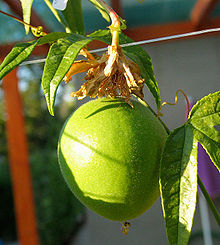Passiflora incarnata
| Passiflora incarnata | |
|---|---|
 |
|
| flower | |
 |
|
| fruit | |
| Scientific classification | |
| Kingdom: | Plantae |
| (unranked): | Angiosperms |
| (unranked): | Eudicots |
| (unranked): | Rosids |
| Order: | Malpighiales |
| Family: | Passifloraceae |
| Genus: | Passiflora |
| Species: | P. incarnata |
| Binomial name | |
|
Passiflora incarnata L., 1753 |
|
 |
|
Passiflora incarnata, commonly known as maypop, purple passionflower, true passionflower, wild apricot, and wild passion vine, is a fast-growing perennial vine with climbing or trailing stems. A member of the passionflower genus Passiflora, the maypop has large, intricate flowers with prominent styles and stamens. One of the hardiest species of passionflower, it is a common wildflower in the southern United States. The Cherokee in the Tennessee area called it ocoee; the Ocoee River and valley are named after this plant, which is the Tennessee state wildflower. This, and other passionflowers are the exclusive larval host plants for the gulf fritillary and non-exclusive for the variegated fritillary butterflies.
The stems can be smooth or pubescent; they are long and trailing, possessing many tendrils. Leaves are alternate and palmately 3-lobed and occasionally 5-lobed, measuring 6–15 centimetres (2.4–5.9 in). They have two characteristic glands at the base of the blade on the petiole. Flowers have five bluish-white petals. They exhibit a white and purple corona, a structure of fine appendages between the petals and stamens. The large flower is typically arranged in a ring above the petals and sepals. They are pollinated by insects such as bumblebees and carpenter bees, and are self-sterile. The flower normally blooms in July.
The fleshy fruit, also referred to as a maypop, is an oval yellowish berry about the size of a hen egg; it is green at first, but then becomes orange as it matures. As with other passifloras, it is the larval food of a number of butterfly species, including the zebra longwing and Gulf fritillary. In many cases its fruit is very popular with wildlife. The egg-shaped green fruits 'may pop' when stepped on. This phenomenon gives the P. incarnata its common name.
...
Wikipedia
